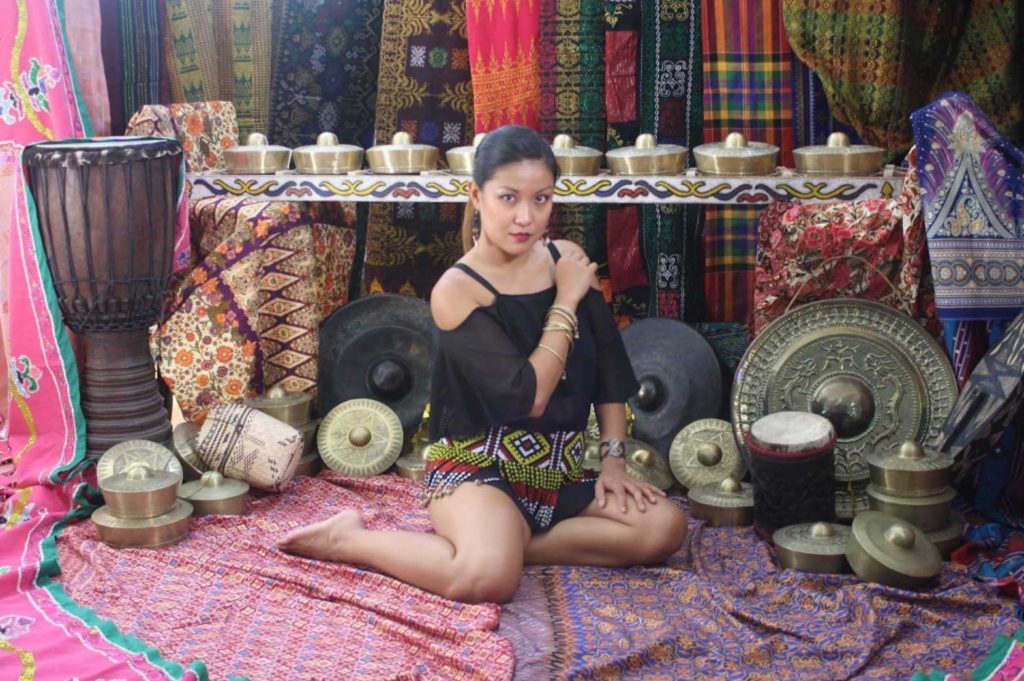Artist’s e-store promotes malong for everyday wear

Lydia Querian with some of her Daily Malong merchandise. JAE TIOSECO
SAN FRANCISCO — Daily Malong, an e-commerce store promoting the indigenous malong, has a dual mission: “To empower weavers and artisans and to extend an appreciation of indigenous crafts to the Filipino communities across North America.”
The site encourages the use of this versatile tubular clothing – it can be used as skirt, scarf or wraparound dress — to reclaim its many functionalities as well as make it a part of the Filipino diaspora’s modern lifestyle.
Dance and music artist Lydia Querian opened this virtual storefront in 2017, and scores of Filipino Americans have discovered a place to acquire their malong apparel and accessories. It used to be that the only way to find these items was by travelling to the Philippines or asking friends to buy them when they visit the country.

The malong face mask. CONTRIBUTED
“Most of my customers are either folk dancers and musicians, cultural practitioners, young professionals, recent college graduates, or those still in school,” says Querian. “My business model allows me to keep prices reasonable so that more people can have a piece of authentic handwoven item. It is a way for them to express their identity that does not involve the national flag, a jeepney, or a barrel man.”
Querian left her corporate work to pursue social entrepreneurship. Originally from the Philippines, she has lived in the San Francisco Bay Area for 10 years and spent her time there doing collaborations with communities and performances. She has toured the U.S. and internationally with Dancing Earth, KulArts, Parangal Dance Company and Fusion Dance Project.
“Many youth in weaving communities are assigning more value to Western culture than their own traditions,” says Querian. “We believe that by demonstrating how much people in the diaspora appreciate their culture and work, it will encourage these youth to take a more active role in perpetuating the traditions, practice them with pride, and value their communities.”
Querian says she travels to weaving villages and builds direct relationships with local artisans.
“I can speak directly to a weaver and explain to her that the finished products go to young Fil-Ams who are really curious to learn about traditional culture. When I find a weaver that is excited about this, they are more willing to offer more specialized pieces.”

The many ways to wear the malong, today. CONTRIBUTED
Purchasing directly from weavers is how she is able to operate sustainably and make her products accessible to younger customers who are generally conscious about budget. It also ensures that weavers can maximize the economic gains from their work. “A master weaver labors for two to three weeks to finish one piece.”
“Not all weavers have the same comfort level when it comes to exporting textiles, which is why I work directly (and establish a relationship) with weavers,” she says. She continuously puts in time to immerse and explore cultures and communities around Mindanao and the Cordillera Region.
In celebration of Filipino American History Month and Indigenous Peoples’ Month in October, Daily Malong will release a documentary to celebrate the dynamic Filipino diaspora and launch a store-wide sale for the month.
The curiosity and interest in indigenous arts have increased, notes Querian.
“Intense research, back and forth traveling to the Philippines and continuous relationship building with indigenous communities inspire our artisans to keep their traditions by making them realize how much it is valued in the West.”

